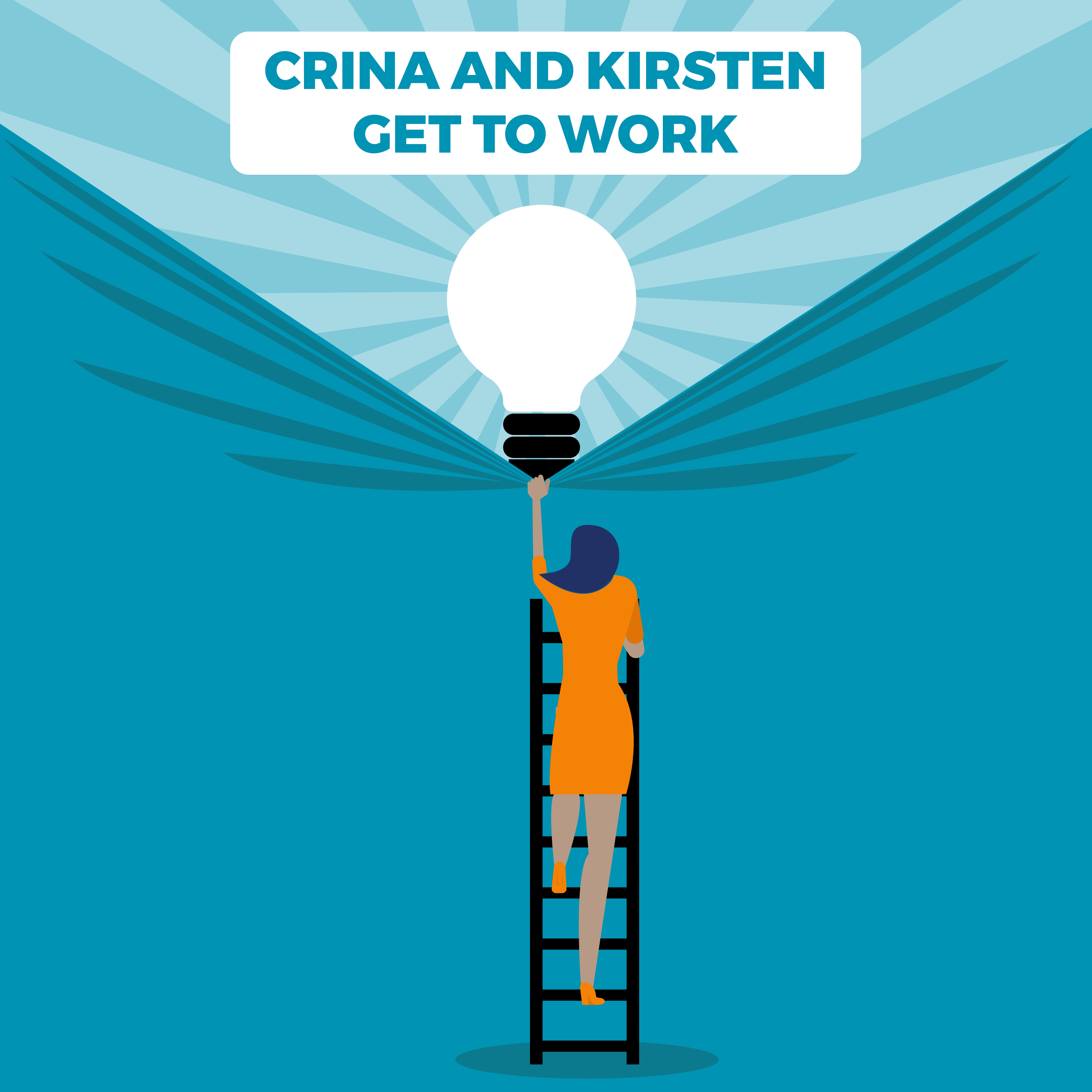Crina and Kirsten Get to Work

We have one single mission: Help women find ease, meaning and joy at work and in life. We use our experiences as business owners, entrepreneurs, mentors and inspirational leaders to explore topics that all working women care about: shitty bosses; smashing the patriarchy; balancing work and life; navigating change and getting what you want! We guarantee that you will be entertained and inspired... promise!
Episodes
Episodes



Friday Aug 28, 2020
What language does your body speak...to YOU?
Friday Aug 28, 2020
Friday Aug 28, 2020
Your body is constantly sending messages to your brain. The good news is that for the most part, you’re in control! Simple changes to your posture, your facial expression, even the way you’re standing can change how you feel!
SHOW NOTES
In this episode of Crina and Kirsten Get to Work, our twosome talks about using your body to hack your brain. What you do with your body can affect your performance, your success - and get you more of that joy, meaning and ease we are looking for in our work. Who knew?!
As with most show topics, this show topic was inspired by a listener and her own struggle with her body’s response during public speaking. Crina has listened to Amy Cuddy’s Ted Talk Your Body Language May Shape Who You Are - and suggested a few of Amy’s strategies on how you can use your body language to affect your own brain and body. We often think about what our body language communicates to others, but this episode is about what your body language communicates to YOU!
Think power poses, think the runner crossing the finish line first and raising arms overhead, think the soccer player scoring a goal and arms thrust overhead and eyes to the sky - these are the poses of winners. Many of these poses are associated with men and masculine traits, but it's time for us fabulous females to own some of that magic. And this is a real thing - a field of science called embodied cognition.
Cuddy conducted an experiment where applicants were interviewed - and the situation was stressful because the interviewers were coached to show no reaction at all. Half of the participants were instructed to do the power pose (arms outstretched and overhead) before the interview and half were instructed to wrap their arms around themselves and curl up. These interviews were taped and when operservers watched the interviews and picked the successful candidates - the cast majority were the candidates who had performed the power pose.
There is some interesting work from Mat Boule in Montreal on how posture affects how you learn and perform.
What we do with our bodies can affect how we perform and how we experience our workplace. Listen in for the extra special not-so-secret strategies on how to get your body to speak the language you need to hear.
And, of course, as always - interesting reads and listens:
Science Says These 11 Body Language Secrets Will Make You More Successful
Your body language may shape who you areccessful.html



Friday Aug 14, 2020
Uncertainty: No Wonder You Feel Like Such a Train Wreck!
Friday Aug 14, 2020
Friday Aug 14, 2020
When the future is unknown we tend to unravel, but is this the only option? While our brains are not trained to settle down in uncertain conditions, it is possible to survive and even thrive when life, and work, is up in the air.
SHOW NOTES
Our hosts on Crina and Kirsten Get to Work do some metaphorical spelunking into our brains on uncertainty - and most importantly - what to do about it. How can you have joy, meaning and ease in your work when you are experiencing uncertainty? Crina and Kirsten will tell you how.
First, an exploration of our brains on uncertainty . . .
According to a 2014 study in the journal Nature Reviews Neuroscience, uncertainty disrupts many of the habitual and automatic mental processes that govern routine action. This disruption creates conflict in the brain, and this conflict can lead to a state of both hypervigilance and outsized emotional reactivity to negative experiences or information. In other words, uncertainty acts like rocket fuel for worry; it causes people to see threats everywhere they look, and at the same time it makes them more likely to react emotionally in response to those threats. And that is no good when it comes to meaning, ease and joy!
And there is lots of uncertainty at work:
Meetings with no agenda
Meetings where you’re put on the spot
No regular check-ins with your supervisor or your team
Unclear expectations
No control of outcomes
Unsafe work environment
Being the “only”
No clear measurements of success
Arbitrary decision-making
Constantly shifting priorities
And or course our wonder women will not leave us holding the big ugly bag of uncertainty. Crina’s “go to” response to uncertainty is to plan or plan not to plan and COVID has presented her with many opportunities to use her coping strategies for uncertainty. Kirsten tends to rely on radical acceptance in the face of uncertainty - to accept what is - or - is not.
Here are some other strategies to deal with uncertainty:
Prepare for different possibilities (a riff on Crina’s planning).
Become a feeling observer.
Get confident about your coping and adapting skills.
Utilize stress reduction techniques preemptively.
Focus on what you can control.
Practice mindfulness.
Don’t expose yourself to too much news
Choose as much as you can to be with people who are calm, authentic and optimistic
And as always - the good reads:
How to Cope With Uncertainty
https://www.sciencedirect.com/science/article/abs/pii/S0965856414002146
Uncertainty and Anticipation in Anxiety
Why we're hardwired to hate uncertainty | Marc Lewis



Friday Jul 31, 2020
Rituals: The Secret Sauce to Satisfaction
Friday Jul 31, 2020
Friday Jul 31, 2020
Performing a ritual has been proven to suppress the anxiety response in the brain. Rituals also calm the mind, help us transition from one task to the next, bond people together and provide structure to otherwise chaotic days.
SHOW NOTES
In this episode of Crina and Kirsten Get to Work, our hosts turn their attention to the importance of rituals - the secret sauce to satisfaction.
The world can be a crazy and chaotic place - and that is certainly true now with COVID and protests and politics and working from home (or not working at all), working outside of your home (back to COVID) plus all of the things that “normal” life presents. Rituals can keep us grounded and connected.
Dr. Nick Hobson is a neuroscientist from the University of Toronto and founder of The Behaviorist, a behavioral and brain science consultancy, describes a ritual as:
a ritual script - a “predefined sequence characterized by rigidity, formality and repetition.”
meaningful - it must be “embedded in a larger system of symbolism and meaning.”
some irrationality associated with it, or “lack instrumental purpose.”
But don’t get stuck on the definition - focus on whether there is meaning in the repetitive action.
While we can have rituals that are just our own, rituals often involve other people. Dr. Cristine H. Legare, associate professor of psychology at The University of Texas at Austin says, “[m]ost rituals are done in groups as collective practices. And there is always group buy-in. The amazing thing is that, unlike habits or routines, they have been shown in social psychology to improve everything—from making your food tastier to making you more motivated.”.
And here are some more benefits from rituals - rituals can regulate
emotions,
performance goal states, and
social connection to others.
Rituals help us regulate strong emotions - think about a funeral. They impose order in the chaos that is sometimes life - think renewing wedding vows. Rituals can also be more everyday - think a family eating pizza and cozying up on a couch to watch a movie every Friday night to wind down from the week and reconnect.
But our hosts are talking about WORK - so what about rituals at work??!!
Work rituals can express values and build connection and have been found to increase satisfaction and productivity. Rituals at work should be as inclusive as possible to ensure everyone can take part. Key questions to ask: is this something that everyone can feel comfortable participating in? What is the impact on overall company culture? What happens if someone wants to opt-out?
Here are some ideas for workplace rituals:
When a new employee joins, how do you welcome and connect the new person:
Lunch out
At one company, each employee leaves something from their desk and the new employee has to find the owner and the story behind the object
DropBox, a company who values delight, dends each new employee the ingredients to make and decorate cupcakes
When an employee leaves, how do you send them off:
At AirBNB, the entire office forms a human tunnel of well-wishers for the departing employee to run through
How do you create connection during COVID:
A weekly Zoom meeting with an interesting question for everyone to answer - and no work topics
Send boxes of snacks and drinks for a Zoom happy hour
Whatever you do, it should be engaging, meaningful and regular - the data says it will make your workplace more productive and satisfying!
And interesting reading:
How Rituals at Work Boost Team Performance (An Investigative Report)| The Beautiful Blog
Using purposeful workplace rituals to build better teams - Bracket



Monday Jul 20, 2020
How to Alienate Your Coworkers and Scar Your Employees for Life
Monday Jul 20, 2020
Monday Jul 20, 2020
Tons of humor and light-hearted commentary about the co-workers and bosses who make our lives miserable.
This show marks the one year anniversary of Crina and Kirsten Get to Work - and what a great and fun ride it has been!! From KMRE Community Powered Radio to the Clubhouse, from Zoom and now from the barn - Crina and Kirsten Get to Work has been on the move and evolving. Most important - thanks to our listeners - we appreciate you and what you contribute to your world and workplaces - and you ask great questions and make great comments.
Because it is our anniversary episode, we want to indulge ourselves and have a little fun calling out some folks who make our workplace miserable - and to laugh a bit and point some fingers - cuz every once in a while that feels good.
Here are the co-workers who bug us . . . .
Co-workers who suck all of the joy out of the room and have nothing good to say or contribute
The know it all who uses information as an aggressive act in the workplace
Co-workers who form cliques and play favorites.
Co-workers who broker information and triangulate - and just anyone who uses communication as an offensive or defensive weapon.
Co-workers who don't accept responsibility and worse, throw others under the bus to avoid being wrong
Co-workers who take up your time without a good reason (and it is not fun)
Co-workers who do not know anything about the people they work with
And here are the Covid complaints . . .
Co-workers who cannot get there mute on (or off)
Co-workers who refuse to turn on their video
Co-workers who behave in a way that makes us think their screen is frozen - we want active listeners!
And just because we can, here is what bugs us about bosses . . .
Bosses who act like everything is urgent
Bosses who continually change strategies and direction
Bosses who keep communication vague
Bosses who are never wrong
Bosses who take credit for your work
Bosses who micromanage us.
And Crina offers some helpful tips to make sure you are not one of these people.
Carve out observational time to observe how you interact with others in the workplace
Put yourself into new environments to get feedback - if you do some volunteer work and run into the same issues you run into at work, it may be you
If the circumstances are right and the environment is safe - ask for feedback from your co-workers.
Understand your own triggers and what causes you to behave in ways that alienates your co-workers and scars them for life - :-)
Seriously, our listeners are perfect - and we hope you enjoy this episode with some light-hearted ribbing.



Friday Jul 03, 2020
Women Celebrating Women
Friday Jul 03, 2020
Friday Jul 03, 2020
Celebrating and honoring women is one of the most effective ways to ensure that more of us step up and engage in our work and our lives. In fact studies show that efforts to call out women's contributions can have a profound impact on our willingness to lead and contribute.
SHOW NOTES
Happy Fourth of July! Not so fast . . . July 4 is a complicated holiday for some Americans. So our hosts decide to pole vault over the thicket of complicated feelings about the 4th and celebrate the contributions women of color have made to the amazing and beautiful quilt that is the American workplace.
This episode of Crina and Kirsten Get to Work is all about inspiration - and what we know from the research is that calling out, recognizing, acknowledging womens’ success in the workplace not only creates more willingness in the women acknowledged to take on bigger challenges, but does the same thing for the women around them. So put on your jet pack, listener, you are on for a rocket fueled inspirational ride.
Dr. Mae Jemeson - the real life Buckaroo Bonzai, astronaut, physician, dancer and on a mission to send humans outside the solar system. We can all learn from her life motto, “live deeply and look up.”
Fawn Sharp - Quinault Nation President and president of the North American Indian Congress. Fawn is a leader among leaders who has used her leadership and the law to advance native people in the United States and to advocate for the protection of the land.
Dr. Alexa Canady - first black female neuroscientist, who made an incredible difference in the lives of the children she cared for - and she struggled with confidence at many points in her career. She cites the mentors in her life for opening doors for her as a key to her success.
Rosalinda Guillen - farm worker organizer and head of the intentionally female-led organization, Community to Community. Rosalinda works for farm worker rights while she transforms our political relationships and our relationship to the land and the people who grow our food.
.
Janice Bryant Howroyd - owner of ActOne Group - a $3 billion dollar company located in 19 countries. Her business philosophy came from her family of 13 - organization, respect and communication.
Yuri Kochiyama - interned in Arkansas after the bombing of Pearl Harbor, which she says was the beginning of her political awakening, she was influenced by Malcom X and spent her life working on civil rights issues.
Look at your story
What makes your life difficult? Can you use it like Yuri Kochiyama?
Where is the opportunity in your life? Maybe you can just look up and see it like Dr. Jemeson
Where do you have the opportunity to make change? Maybe like Rosalinda Guilien, it is literally where you stand.
What is your contribution to work?
And enjoy this good stuff . . .
Fawn Sharp, Newly Elected NCAI President, to Tap 'Strength and Braintrust All Across Indian Country'
Fawn Sharp World Ceres Talk: "Climate Impact on the Future of the Quinault Nation"
Latina Lens: Rosalinda Guillen
Rosalinda Guillen: Rainbow Coalition; United Farm Workers (UFW); LUPE; Community to Community Development (C2C) - Seattle Civil Rights and Labor History Project
Janice Bryant Howroyd - https://www.youtube.com/watch?v=9DfaTtDNMb0



Thursday Jun 18, 2020
So, You Just Lost Your Job...Now What?
Thursday Jun 18, 2020
Thursday Jun 18, 2020
Many of us are out of work and struggling to manage the very real, difficult reality of losing a job. Whether you were laid off, furloughed or are simply concerned about your job security, we want to help you manage the emotions, examine your situation and make a plan to move forward.
SHOW NOTES
In this episode of Crina and Kirsten Get to Work, our fierce friends tackle losing your job - YIKES! Some people lose their job because there is a pandemic, business closure or some other reason out of their control, others lose their job because the boss is a jerk or just plain wrong and some of us lose a job because our skill set is in some way not matched to the job.
So what do you do when this happens? First, throw an effective, but short pity party. Second, get to work!
Reframing the situation is the first step - what opportunities are out there? Kirsten’s sister was fired from a job over 20 years ago and as a result now runs a very successful and highly regarded veterinary hospital. Now that’s a silver linin!. Kirsten also has clients routinely tell they are in the end glad they were let go because they were MISERABLE! Crina has experienced the same thing with people she has terminated. There may be something good in losing a job - really!
Spend some time understanding what went wrong - and the only person you can control is yourself - so mine for gold there. How did this happen? Was it the pandemic? If so, maybe that’s enough digging. If not, how did you find yourself with no job - and while there will certainly be people you want to blame, you will make the next decision about a job. What do you need to know about yourself to make the next decision about a job a great one?
Make a plan - do you need to talk with a lawyer to determine whether your termination was about the color of your skin, your gender, your age, disability or some other protected status? And get that unemployment application in! Do you want the same job or is it time for a new kind of job? While you are deciding and once you have decided and are looking, keep your contacts warm, continue to educate yourself - look for ways to acquire new skills or training.
And most importantly, treat yourself well during this time - get sleep, exercise, stay in touch with friends and colleague and keep that incredible brain firing - doing this will help you ward off depression and getting stuck and move you
And the interesting reads referenced in the episode:
CEO of Airbnb Taught Us an Extraordinary Lesson When He Fired 25% of His Company
What to Do When You Have Been Fired
The Employment Situation - April 2020



Friday Jun 05, 2020
You Need More Vacations!!
Friday Jun 05, 2020
Friday Jun 05, 2020
Taking a vacation is one of the most effective ways to improve your work, change your perspective and recharge your batteries. Now more than ever we encourage all of you to find ways to disconnect and focus on you.
SHOW NOTES
This episode of Crina and Kirsten Get to Work is all about VACATIONS!! Yeah! Time off, a get away, a break, a grand adventure, slowing down or maybe speeding up - whatever you find restorative and enriching. This episode was taped before the pandemic, and while it did not feel timely to our hosts to release an episode on travel in the middle of stay at home proclamations and orders, given that some of that is easing and lots of listeners are telling us they need a change of scenery, it is time to discuss how good it is to create a vacation for yourself - and being closer to home can still be great.
Before our hosts take off on the vacation topic, they consider the advantages of shorter, yet still meaningful breaks in your day. Crina talks about her time with trees, and as usual, Kirsten has her head in a book called Stillness is the Key by Ryan Holiday, which discusses the benefits of space to your intellectual, physical and spiritual well-being.
The data about vacations very clearly tells us that vacations increase productivity and satisfaction in the workplace. In fact, studies show that even planning your vacation can lift your spirits. And, just an additional 10 hours of vacation can improve performance according to a study by Ernst & Young.
Too many people let cost, pets, concern about work coverage, too much work, fear of being gone from work or home get in the way of what is an uplifting and rejuvenating experience, including the 52% of Americans who do not use all of their vacation. WHAT??!!
Our host end this show with some tips about how to make getting out of and coming back to the workplace easier, a discussion about whether you work while you are on vacation (mostly no) and how to make the most of your time away. So get out there and enjoy!
And now . . . . the fun reads.
5 reasons you need to take a vacation according to science.
Opinion | Relax! You'll Be More Productive
Why You Need to Take a Vacation (Even When You Can't Afford One)
USTravel.org
What to Do With a Day off



Friday May 22, 2020
Anxiety!
Friday May 22, 2020
Friday May 22, 2020
We all feel anxious at work sometimes, and for some, these emotions impact performance, relationships with coworkers and the quality of their work.
SHOW NOTES
On this episode of Crina and Kirsten Get to Work our terrific twosome analyze anxiety in the workplace.
Anxiety is a feeling of worry, nervousness, or unease about an imminent event or something with an uncertain outcome. Anxiety can also be triggered after the fact, i.e. by a death, job loss. Anxiety can express itself as feeling nervous, jittery, sick to your stomach, jumpy, tired, irritable, dry mouth, sweaty and having difficulty sleeping – these are all signs of anxiety. And Crina explains that if you get sweaty, panty liners stuck to the inside of your jacket is an excellent solution.
And what causes it – what does not?!! Deadlines, conflicts at work, managing people, unclear expectations, and of course - a pandemic. Anxiety is prevalent among women at work. A study referenced in Mind Matters: Anxiety in the Workplace says 71% of women experience anxiety in the workplace.
How do we manage it and how do we know when we need help? Help may be just the thing if your anxiety interferes with your participation at work or in your life. If you avoid experiences because of anxiety or feel as if your suffering is not reasonable, get help from a licensed therapist or counselor.
Experts believe, in fact, that people may be hard-wired in the way they experience anxiety. Although scientists still don't precisely understand the interactions among genetic, environmental, psychological, and developmental factors, research suggests that high anxiety tends to run in families.
And of course there are real COVID reasons for anxiety both in and outside of the workplace - women are on the front lines in healthcare (80% are women) and in women in social services (83% are women) according to Tina Tchen of Time’s Up - and there are real risks being on the frontlines. Covid also presents loves of uncertainties for all of us - what will returning to work be like, is it safe, will I catch it, is the information I am seeing in the news accurate, will I get a job in what will likely be a competitive market?
So what do we do:
Work – people need meaningful work.
Talk with a Friend you Trust – it usually make us feel better
Be Organized and Prepare Yourself – when you are organized and prepared there is less to worry about
Educate yourself about Anxiety – it will help you learn whether you need help to manage
Ask for help – both inside and outside of work
Stay organized. Filing and clearing your desk and computer desktop may rank low on your priority list, but they can save you time in the long run and may prevent a crisis later.
Avoid toxic coworkers. Try to ignore negativity and gossip in your workplace.
Take breaks. A walk around the block or a few minutes of deep breathing can help clear your head.
Be Healthy - eat healthfully, get enough sleep, exercise regularly, and limit caffeine and alcohol. Try to keep your body and mind in shape.
Engage deeply in the here and now.
Check out these articles for more inf
Anxiety and Stress in the Workplace
Mind Matters: Anxiety in the Workplace
Mind Matters: Anxiety in the Workplace
https://www.verywellmind.com/work-anxiety-4692762
Managing Stress and Anxiety

Crina and Kirsten Get to Work
Crina and Kirsten dish on all things related to women and work. Through engaging conversations and witty banter, they will inspire you to seize your power and create meaningful, joyous, fun and rewarding work in their business podcast. While exploring motivational podcast topics such as authenticity, shitty bosses, friends and negotiation, Crina and Kirsten lift up women and show the patriarchy “the hand” and “the finger”.








